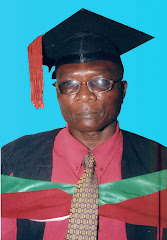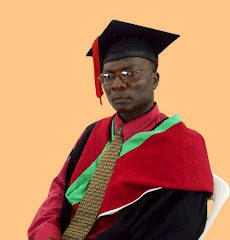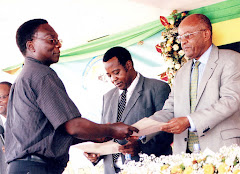Sunday, August 27, 2017
Crop experts widens up their knowledge to save cassava plant
In what seems to be the move to help the majority consumers of a cassava plant in the clountrey and all over the world, botanical scientists are struggling the breakthrough of the cassava crop from the verge of extinction. From their research point of view, they have identified the first ever genetic markers associated with resistance to two deadly cassava viral diseases in Tanzania’s grown varieties. The International Institute for Tropical Agriculture (IITA), in a statement availed to media houses over the week end has identified the two varieties as Namikonga and Albert. Mostly grown by Tanzanian farmers, the varieties are capable of withstanding the devastating Cassava Brown Streak Disease (CBSD) and Cassava Mosaic Disease (CMD), unlike other varieties. A team of scientists that has been studying the varieties’ DNA has successfully identified the genetic markers linked to their resistance to each of the viral diseases. The markers can be used to speed up the often long and expensive conventional breeding for cassava varieties with dual resistance to the diseases. “We are very happy with the findings of our studies which are a result of over six years of research. “It is an important milestone in the efforts to revive cassava production in East, Central and Southern Africa where the two diseases remain a serious problem, threatening the region’s food security,” said Morag Ferguson, a molecular breeder at IITA. Ferguson said for West Africa, where there is great fear of CBSD spreading and with devastating effects on the food security, the markers can assist in pre-emptive breeding. Namikonga and Albert, which are genetically related, have been grown by farmers in areas that are hotspots for the two viral diseases for many decades and have shown high resistance despite being subjected to the diseases for a long period.
Cassava tuber
Namikonga is tolerant to CBSD but highly susceptible to CMD while in contrast, Albert is highly susceptible to CBSD but resistant to CMD. The international team, drawing scientists from Tanzania, Kenya, South Africa, and the United States, crossed the two Tanzanian varieties and studied a large population of the progeny over two seasons in two disease hotspots in the country. “The studies have enabled us to better understand the location of genes we suspect are associated with resistance to CBSD in the DNA of the farmer-preferred cassava variety, Namikonga, and CMD in the variety Albert,” noted Ms Esther Masumba, the molecular breeder from the Ministry of Agriculture, Livestock and Fisheries. She added, “Once validated, this will help speed up breeding through marker-assisted selection (MAS) which shortens the breeding cycle and reduces the offspring population that breeders have to work with. Breeders will be able to quickly narrow down from the thousands of offspring to only those with the desired markers.” She was part of the research team and conducted the study as part of her PhD studies at the University of Pretoria, South Africa. Most of the cassava breeding programmes in Africa use purely conventional breeding methods that are laborious and expensive due to long breeding cycles and the need for large field trials. The application of molecular markers in breeding and selection of crop varieties can both reduce breeding time and costs. The research team will now continue to validate these markers for their applicability in marker assisted breeding (MAB).
Shortage of food to affect refugees at Kigoma designated camps
The United Nations’ World Food Programme
(WFP) has raised an alarm following starvation that looms at refugee camps in
Kigoma. Following this situation, it has called over funding should b e made
available in order to feed 320,000 refugees in Kigoma. WFP says that it needs
23.6 million US dollars (about 52bn/-) between now and December to supply food
to the immigrants. WFP Tanzania Country Representative Michael Dunford said in
a statement in Dar es Salaam yesterday that the UN agency has reduced food
rations for the refugees in Mtendeli, Nduta and Nyarugusu camps in northwest
Tanzania due to funding constraints. “WFP urgently requires 23.6 million
dollars between now and December to continue meeting the food and nutritional
needs of the refugees,” reads the statement. Home Affairs Minister Mwigulu
Nchemba, addressing refugees over the weekend, warned against the reduced food
rations, which he related to increased conflicts pitting the immigrants against
residents around the refugees’ camps. “International laws require provision of
food to all refugees in camps by 100 per cent of their needs... failure to
provide refugees with adequate food is fueling insecurity since they look for
alternative means to fend for themselves,” the minister warned.
During his
visit to the camps, Mr Mwigulu was informed by Muhambwe Member of Parliament,
Mr Atashata Nditiye, of increased conflicts in the area, accusing refugees of
stealing food from the villagers’ farms. The officer in charge of Mtendeli
refugees’ camp, Mr Optatus Kazonde, told the minister that the rations for
refugees had been reduced to 60 per cent, noting that the reduction was one of
the measures to compel immigrants to return to their home countries. The UN
agency provides refugees, primarily from Burundi and the Democratic Republic of
the Congo (DRC), with five food commodities -- maize meal, pulses, super
cereal, vegetable oil and salt. Due to funding shortages, all five commodities
were reduced for August distribution, reaching only 62 per cent of the 2,100
required kilo calories, the recommended daily calorie intake, the statement
said. “Without an immediate response from donors, further ration cuts will be
necessary as food stocks are simply running out. “While WFP appreciates the
support received so far, we urgently appeal to donors to quickly come to the
aid of the refugees and provide additional funding so that we can return to
full rations and avoid any prolonged negative impacts,” the WFP boss stressed. Reducing
rations result in far-reaching and potentially life-altering consequences for
refugees as cutting the intake of kilo calories and nutritional support can lead
to acute malnutrition and increased vulnerability to disease. In addition to
the five food items, WFP also provides hot meals for refugees upon arrival,
supplemental rations for pregnant and nursing women and food assistance to
hospital in-patients and people living with HIV/AIDS. The agency noted however
that hot meals for refugees entering the country and supplementary feeding
programmes remain unaffected by the current ration reductions. WFP is the
world’s largest humanitarian agency fighting hunger worldwide, delivering food
assistance in emergencies and working with communities to improve nutrition and
build resilience. Each year, WFP assists some 80 million people in 80
countries.
Kikwete see to good governance is the last resort to end chaos in Africa region
Former Tanzanian President, Dr Jakaya
Kikwete, has underscored the role of good governance and rule of law in
steering peace and security for an integrated united and sustainable Africa. Discussing
a paper presented last week at Leaders forum in Johannesburg city by former
Vice-Chancellor of the University of South Africa, Professor Barney Pityana, on
Good Governance and Rule of Law, Dr Kikwete called upon political parties in
Africa to co-exist amicably. According to him, political parties in power
should not view opposition parties in the same countries as opponents, but
rather as partners in fostering democratic principles based on the rule of law.
Dr Kikwete who has in recent days played a key role in restoring peace in
Libya, reminded delegates attending the African Leadership Forum 2017 that most
political parties in Africa were still growing. Citing the example of his home
country Tanzania, Dr Kikwete said the multiparty system was restored in 1992
and are currently still building themselves for the people to understand their
policies. He called upon Members of Parliament (MPs) from the ruling party to
take to task the government when the ministries are not functioning as per the
election manifesto of their political party. “It is healthy for such MPs to
question when there is crisis in a particular party in Africa and this plays a
key role in guaranteeing the rule of law that perpetuates good governance.
Former Tanzania's President DSr. Jakaya Mrisho Kikwete
He called
upon opposition parties in Africa to concede defeat after an election has been
held fairly, freely and democratic. According to Dr Kikwete, good governance
without strong government is not possible, so the need to have a bold
parliament which should offer checks and balances whenever need arises. To
steer peace and security in Africa, retired President Benjamin Mkapa called
upon the media in Africa to be patriotic while rendering their services for the
betterment of the continent. Former President Thabo Mbeki called upon African
leaders to improve the lives of the people by ensuring that they are protected
and taken care of. Mbeki lamented that most African nations are facing problems
of political crisis and insecurity, which, he said, are responsible for the
death of many citizens on daily basis. “The issue of peace and security is an
important topic on our continent because of the challenges that we continue to
face. Obviously, they are with us. They are visible, every day…” he said. The
veteran politician also told delegates at the conference that the need to
address insecurity in African countries can never be overemphasized because
“many of us will sense that some of our countries where there is no conflict
yet … it may break out some point.” Mbeki expressed confidence that
participants at the meeting have come out with positive ideas and also proffer
solutions to the numerous challenges in the continent, not to just address and
describe these challenges.
Samia stresses the need to help women in Tanzania
The Vice-President Ms. Samia Suluhu has
called on banks to consider creating a special lending interest rate for women
in small and medium enterprises in a bide to reduce the high level of poverty
among them. Ms. Samia made the call during the launching of the Women
Empowerment Forum that kicked of on Friday last week in Dar es Salaam. The
event had been sponsored by CRDB Bank with the view to help women in the
country the majority of who are still faced with high level of poverty. The VP thanked
the CRDB Bank Ltd for their innovative strategies they have shown to help women
rom high interest rates which are crippling their undertakings now and then “High
interest rates are backpedalling women’s efforts in coming out of poverty
shackles,” Ms Samia said. She added that banks "should also come up with innovative
ideas to attract women in banking their savings ... I know most of them are
using piggy banks as means of saving their income. The VP launched the Dar
Women Empowerment chapter before a crowd of almost 4,000 women across the
city's five districts - Ilala, Kinondoni, Temeke, Kigamboni and Ubungo. She
said that by uniting under the umbrella of Dar Women Empowerment Forum, the
banks will go to them since the forum makes it easy for financial institutions
to address women’s needs and create tailor-made products such as loans at
affordable rates. Dar Women Empowerment Forum has some 15,000 members coming
from grassroots levels - start-ing from street to ward to district levels. Speaking
at the event, National Economic Empowerment Council Executive Director, Beng’i
Issa said Dar became the 23rd region to estab-lish such forums. “The idea after
opening a regional forum is for the same to cascade to dis-trict up to street
level in every region,” Ms Beng’i said. She said that so far Njombe, Rukwa and
Ruvuma regions have yet to create such forums in their respec-tive areas. The
Tanzania Women Commerce Chamber Secretary General, Jaquiline Maleko, said the
regional forum came after successfully establishing nine of them at border
posts to assist women from understanding their business rights and
opportunities around them. “The idea of having regional women empowerment
forums is the Brainchild of VP Samia after seeing the success of the border
posts ones. She then ordered the creation of the same starting at regional
level,” Ms Maleko said. To support the initiative, CRDB Bank, apart from
sponsoring the event that was televised live, donated 20m/- as seed money for
the revolving fund to empower women in Dar.es Salaa. CRDB Bank Managing
Director, Dr Charles Kimei, said women are good when it come to saving but
under mattresses and the bank has come up with a new product Sim Account that
operates similar to mobile phone money platforms but has a bank account. “SimAccount
is a bank on mobile phone and one can open an account from any mobile phone
service opera-tors.” “The group account is like a WhatsApp account and any one
in the group can deposit and preview the account statement to see amount
deposited or withdrawn,” Dr Kimei said. The bank used the forum to launch the
SimAccount that is geared towards simplifying banking services and combined
mobile phone money transfer and banking services. “The SimAccount will increase
banks’ financial inclusion, which at the moment stands at 17 per cent of total
bankable population,” Dr Kimei said. Ilala District Commissioner (DC), Ms
Sophia Mjema, said that in the near future they want the women forum to
establish specific areas as markets for their products. “We want to have
designated markets for selling these women’s products at specific areas in Dar.
For instance, buyers will know that if I want say flower pots, I can get them
at this area and so forth,” she said. The DC was also representing Dar RC at
the forum and she is also Dar Women Empowerment Forum chair. The agenda, she said, is empow-ering a large
number of women and elevating them to next level coming 2020. “CRDB Bank is
ready as to lend us women under the forum. We should seize the opportunity,”
she said. At the moment 23 regions, 105 municipalities, and 236 wards have
established such forums countrywide.
Vietnam expresses desire to invest in Tanzania
Exports
of raw cashew nuts will soon cease, thanks to the arrival of Vietnamese firms
that have expressed interest to revive all idle factories and construct many
more. According to Industry, Trade and
Investment Minister Charles Mwijage, Tanga region will be the first beneficiary
under the envisaged distribution of agricultural inputs, training of citizens
on modern cashew nut production systems and job creation. Available data show
that about 90 per cent of Tanzanian cashew nuts is exported to India in raw form,
with the small portion, less than 10 per cent, processed in the country. The
country has huge potential of expanding production and increasing productivity
as well as adding value of the cash crop beyond the current 10 per cent, making
use of byproducts, as well. Mr Mwijage, speaking in Dar es Salaam during the
final preparations for a business delegation to India, said: “The coming of
Vietnam is a result of improved investment environments... we do expect many
more investors.”He said after Tanga, the Vietnamese investors would go to
Lindi, Mtwara and other areas, training and encouraging Tanzanians to produce
cashew nuts. The business delegation, with representatives from 17 companies,
left the country on Saturday for a two-day workshop that ends tomorrow, aimed
at, among other things, to strengthen trade cooperation between the two
nations.
The minister said the relevant investment authorities, including
Tanzania Investment Centre (TIC) have been improving investment parks,
countrywide, to avail potential investors with many options to invest. The
investment park setting has been executed under the supervision of Regional and
District Commissioners, said Mr Mwijage, adding that investment areas are
already available in Dar es Salaam (Kigamboni), Ruvuma (Songea), Coast
(Bagamoyo) and Singida. Investors will only be subjected to practise levelling
in term of setting water, electricity and other simple infrastructures in line
with the nature of investment, the Minister said, adding: “Our experts,
especially those from Export Processing Zone will use the workshop in India to
promote the available investment opportunities in the country.” Meanwhile, Mr
Mwijage has appointed Dr John Mduma as acting Director General of the Fair
Competition Commission effective today. Dr Mduma who is Senior Lecturer of the
University of Dar es Dar es Salaam’s Economics Department replaces Dr Frederick
Ringo whose term has expired.
Subscribe to:
Posts (Atom)













